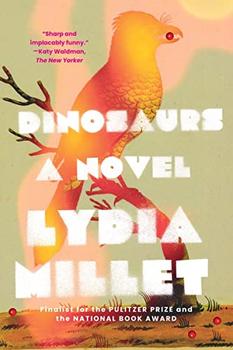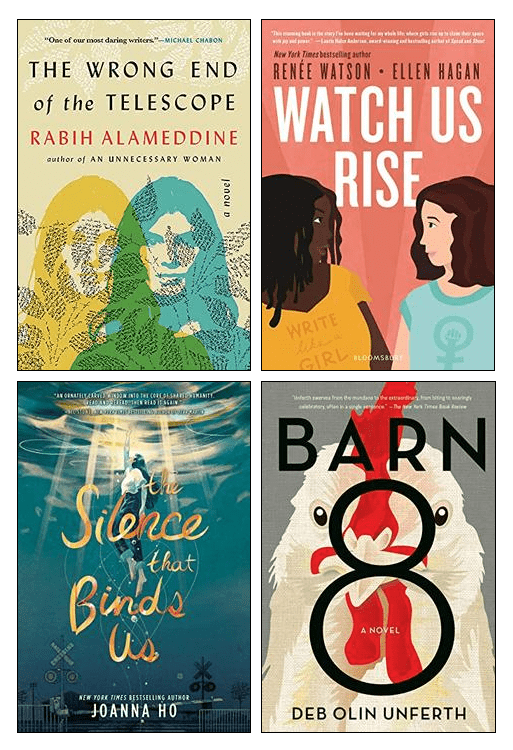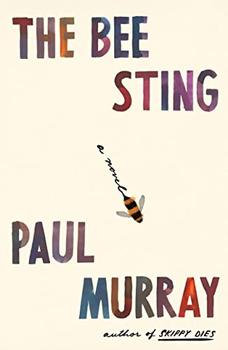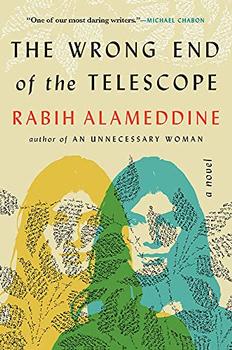Summary | Excerpt | Reading Guide | Reviews | Beyond the book | Read-Alikes | Genres & Themes | Author Bio

Critics' Opinion:
Readers' Opinion:
First Published:
Oct 2022, 240 pages
Paperback:
Aug 2023, 256 pages
 Book Reviewed by:
Book Reviewed by:
BookBrowse First Impression Reviewers
Buy This Book
Over twelve novels and two collections Lydia Millet has emerged as a major American novelist. Hailed as "a writer without limits" (Karen Russell) and "a stone-cold genius" (Jenny Offill), Millet makes fiction that vividly evokes the ties between people and other animals and the crisis of extinction.
Dinosaurs is the story of a man named Gil who walks from New York to Arizona to recover from a failed love. After he arrives, new neighbors move into the glass-walled house next door and his life begins to mesh with theirs. In this warmly textured, drily funny, and philosophical account of Gil's unexpected devotion to the family, Millet explores the uncanny territory where the self ends and community begins―what one person can do in a world beset by emergencies. In the shadow of existential threat, where does hope live?
MOURNING
WHEN HE DECIDED to leave New York, he chose Arizona because of some drone footage he'd seen. It wove through the canyons of red-rock mountain foothills, over sage-green scrub and towering cacti with their arms outstretched. Then up into the higher elevations, where there were forests of ponderosa pine.
Sky islands, was what they called those desert mountains.
Gil was keenly aware, watching the video, that he himself would never glide over the rolling landscape with that hypnotic steadiness. Would never coast over trees as the metal bird did—close enough to see the clusters of green needles on the pine boughs dip and sway in the wind.
He was also aware of the artifice of the soaring choral music the footage was set to. No landscape came with that.
Still it captured him. The desert had an alien beauty that seemed as different as you could get, within the lower forty-eight. The opposite of Manhattan.
He recognized the pattern. He went to new places because they ...
Millet is a beautiful writer, with a calm and expansive style. She ties up some loose ends of the story, but not all, so that the reader will find it pleasing to contemplate what may happen to these characters down the road (Susan K). Gil is a rather quiet man, but very kind and big-hearted. The story is about relationships he forms with his new neighbors, and others. I ended up falling a little bit in love with Gil by the end of the book (Jennie R). This is a simple story — dryly funny, insightful and emotionally moving. I enjoy Millet's writing and would also recommend A Children's Bible and Mermaids in Paradise (Catharine L). The story, while rather simple, is rich with material to discuss and ponder. The allegory of the castle next to the glass house, the birds of the desert evolved from dinosaurs, friendships and life and death are all woven into this lovely story (Sharon J)...continued
Full Review
(685 words)
This review is available to non-members for a limited time. For full access,
become a member today.
(Reviewed by BookBrowse First Impression Reviewers).
 In Lydia Millet's Dinosaurs, independently wealthy Gil grapples with the guilt brought on by his privilege and financial abundance. He tries to find ways to give back to those around him, through volunteer work and other means. A character's choice to actively attempt to do good deeds, or to change the world for the better, is one rich with narrative possibilities. It raises questions about what it means to be in a position to improve the lives of others, who gets to decide what is best for who else, and what type of work is most important or substantial. Below are a few other novels in which the motivations and morality of those trying to do good are explored. You can find more related novels in our Activism and Volunteering category.
...
In Lydia Millet's Dinosaurs, independently wealthy Gil grapples with the guilt brought on by his privilege and financial abundance. He tries to find ways to give back to those around him, through volunteer work and other means. A character's choice to actively attempt to do good deeds, or to change the world for the better, is one rich with narrative possibilities. It raises questions about what it means to be in a position to improve the lives of others, who gets to decide what is best for who else, and what type of work is most important or substantial. Below are a few other novels in which the motivations and morality of those trying to do good are explored. You can find more related novels in our Activism and Volunteering category.
...
This "beyond the book" feature is available to non-members for a limited time. Join today for full access.

If you liked Dinosaurs, try these:

by Paul Murray
Published 2024
From the author of Skippy Dies comes Paul Murray's The Bee Sting, an irresistibly funny, wise, and thought-provoking tour de force about family, fortune, and the struggle to be a good person when the world is falling apart.

The Wrong End of the Telescope
by Rabih Alameddine
Published 2022
By National Book Award and the National Book Critics' Circle Award finalist for An Unnecessary Woman, Rabih Alameddine, comes a transporting new novel about an Arab American trans woman's journey among Syrian refugees on Lesbos island.





The House on Biscayne Bay
by Chanel Cleeton
As death stalks a gothic mansion in Miami, the lives of two women intertwine as the past and present collide.

The Flower Sisters
by Michelle Collins Anderson
From the new Fannie Flagg of the Ozarks, a richly-woven story of family, forgiveness, and reinvention.

The Funeral Cryer by Wenyan Lu
Debut novelist Wenyan Lu brings us this witty yet profound story about one woman's midlife reawakening in contemporary rural China.
Your guide toexceptional books
BookBrowse seeks out and recommends the best in contemporary fiction and nonfiction—books that not only engage and entertain but also deepen our understanding of ourselves and the world around us.